A Detailed Examination of Hobbes's Law of Nature and its Relevance
VerifiedAdded on 2023/06/11
|6
|1326
|83
Essay
AI Summary
This essay delves into Thomas Hobbes's Law of Nature, defining it as a principle discovered through reasoning that promotes self-preservation and discourages self-harm. Unlike civil laws, natural laws are intrinsically understood and universally accepted. The essay highlights Hobbes's assertion that individuals must seek peace and compromise certain rights to ensure their security. The first law of nature emphasizes the pursuit of peace, while the second advocates for the mutual transfer of rights to a sovereign power. These laws are interconnected, as the right to do everything necessitates a compromise for peaceful coexistence. The essay concludes that understanding and adhering to natural laws are essential for maintaining peace and securing natural rights, offering a concise overview of Hobbes's philosophical perspective. Desklib provides access to this essay along with a wide range of study resources, including past papers and solved assignments.
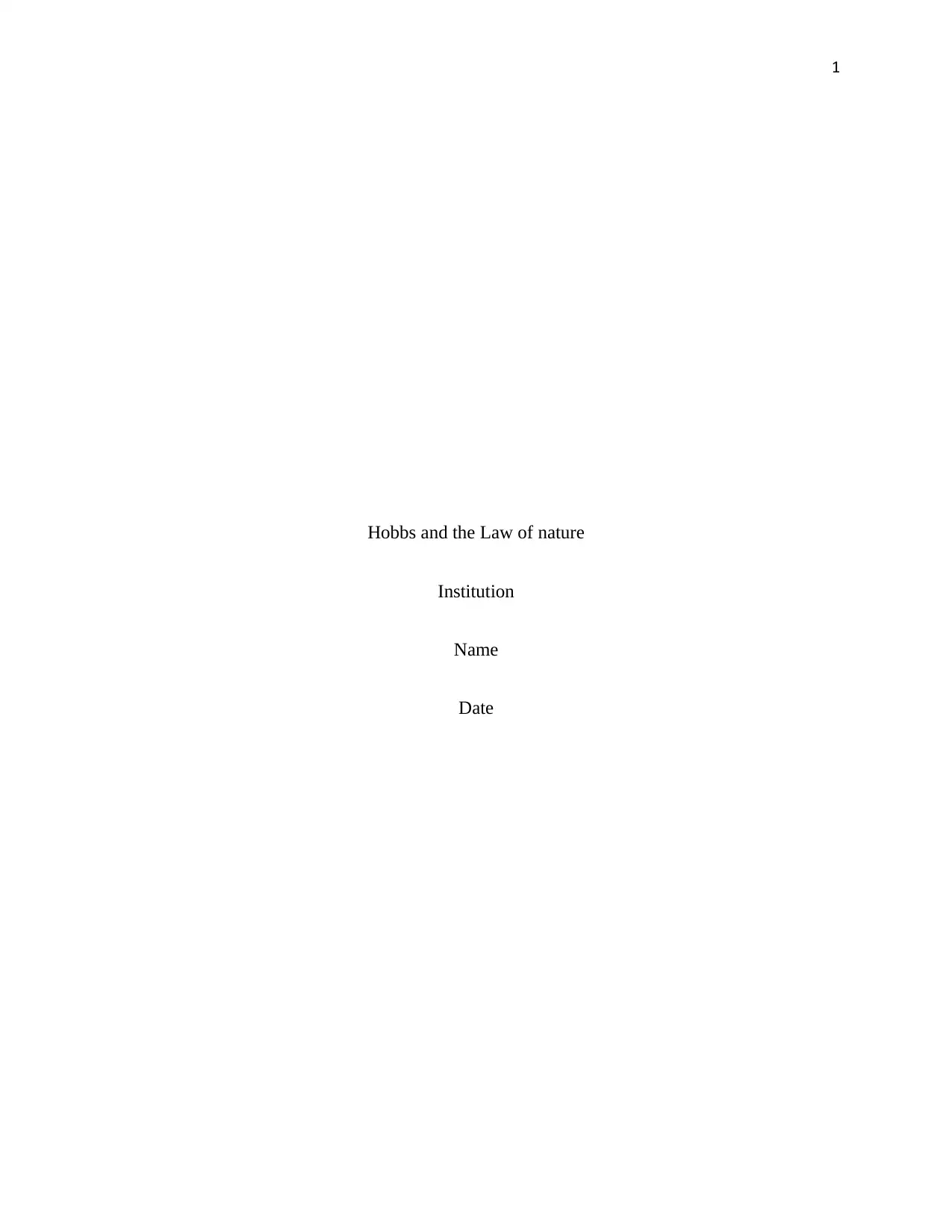
1
Hobbs and the Law of nature
Institution
Name
Date
Hobbs and the Law of nature
Institution
Name
Date
Paraphrase This Document
Need a fresh take? Get an instant paraphrase of this document with our AI Paraphraser
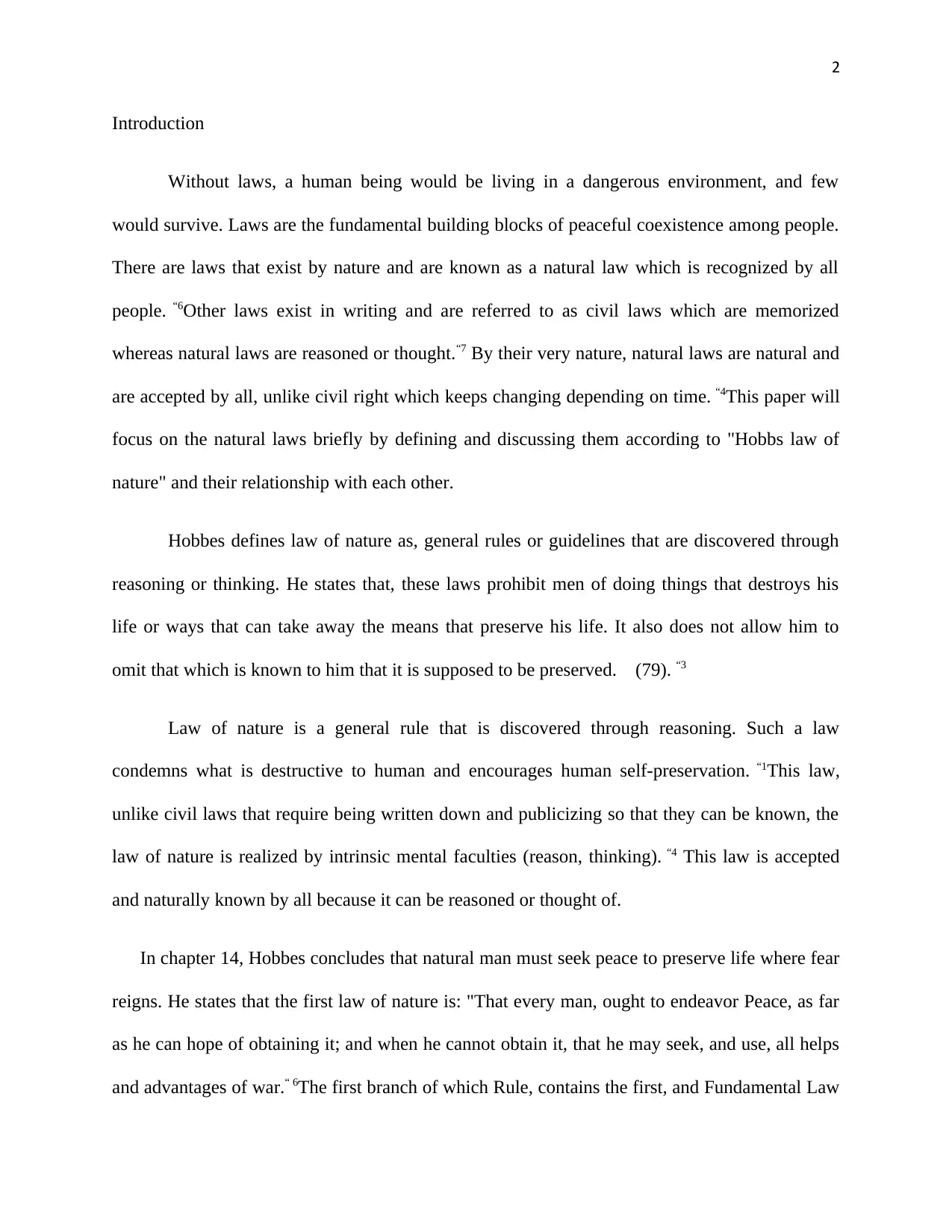
2
Introduction
Without laws, a human being would be living in a dangerous environment, and few
would survive. Laws are the fundamental building blocks of peaceful coexistence among people.
There are laws that exist by nature and are known as a natural law which is recognized by all
people. “6Other laws exist in writing and are referred to as civil laws which are memorized
whereas natural laws are reasoned or thought.“7 By their very nature, natural laws are natural and
are accepted by all, unlike civil right which keeps changing depending on time. “4This paper will
focus on the natural laws briefly by defining and discussing them according to "Hobbs law of
nature" and their relationship with each other.
Hobbes defines law of nature as, general rules or guidelines that are discovered through
reasoning or thinking. He states that, these laws prohibit men of doing things that destroys his
life or ways that can take away the means that preserve his life. It also does not allow him to
omit that which is known to him that it is supposed to be preserved. (79). “3
Law of nature is a general rule that is discovered through reasoning. Such a law
condemns what is destructive to human and encourages human self-preservation. “1This law,
unlike civil laws that require being written down and publicizing so that they can be known, the
law of nature is realized by intrinsic mental faculties (reason, thinking). “4 This law is accepted
and naturally known by all because it can be reasoned or thought of.
In chapter 14, Hobbes concludes that natural man must seek peace to preserve life where fear
reigns. He states that the first law of nature is: "That every man, ought to endeavor Peace, as far
as he can hope of obtaining it; and when he cannot obtain it, that he may seek, and use, all helps
and advantages of war.“ 6The first branch of which Rule, contains the first, and Fundamental Law
Introduction
Without laws, a human being would be living in a dangerous environment, and few
would survive. Laws are the fundamental building blocks of peaceful coexistence among people.
There are laws that exist by nature and are known as a natural law which is recognized by all
people. “6Other laws exist in writing and are referred to as civil laws which are memorized
whereas natural laws are reasoned or thought.“7 By their very nature, natural laws are natural and
are accepted by all, unlike civil right which keeps changing depending on time. “4This paper will
focus on the natural laws briefly by defining and discussing them according to "Hobbs law of
nature" and their relationship with each other.
Hobbes defines law of nature as, general rules or guidelines that are discovered through
reasoning or thinking. He states that, these laws prohibit men of doing things that destroys his
life or ways that can take away the means that preserve his life. It also does not allow him to
omit that which is known to him that it is supposed to be preserved. (79). “3
Law of nature is a general rule that is discovered through reasoning. Such a law
condemns what is destructive to human and encourages human self-preservation. “1This law,
unlike civil laws that require being written down and publicizing so that they can be known, the
law of nature is realized by intrinsic mental faculties (reason, thinking). “4 This law is accepted
and naturally known by all because it can be reasoned or thought of.
In chapter 14, Hobbes concludes that natural man must seek peace to preserve life where fear
reigns. He states that the first law of nature is: "That every man, ought to endeavor Peace, as far
as he can hope of obtaining it; and when he cannot obtain it, that he may seek, and use, all helps
and advantages of war.“ 6The first branch of which Rule, contains the first, and Fundamental Law
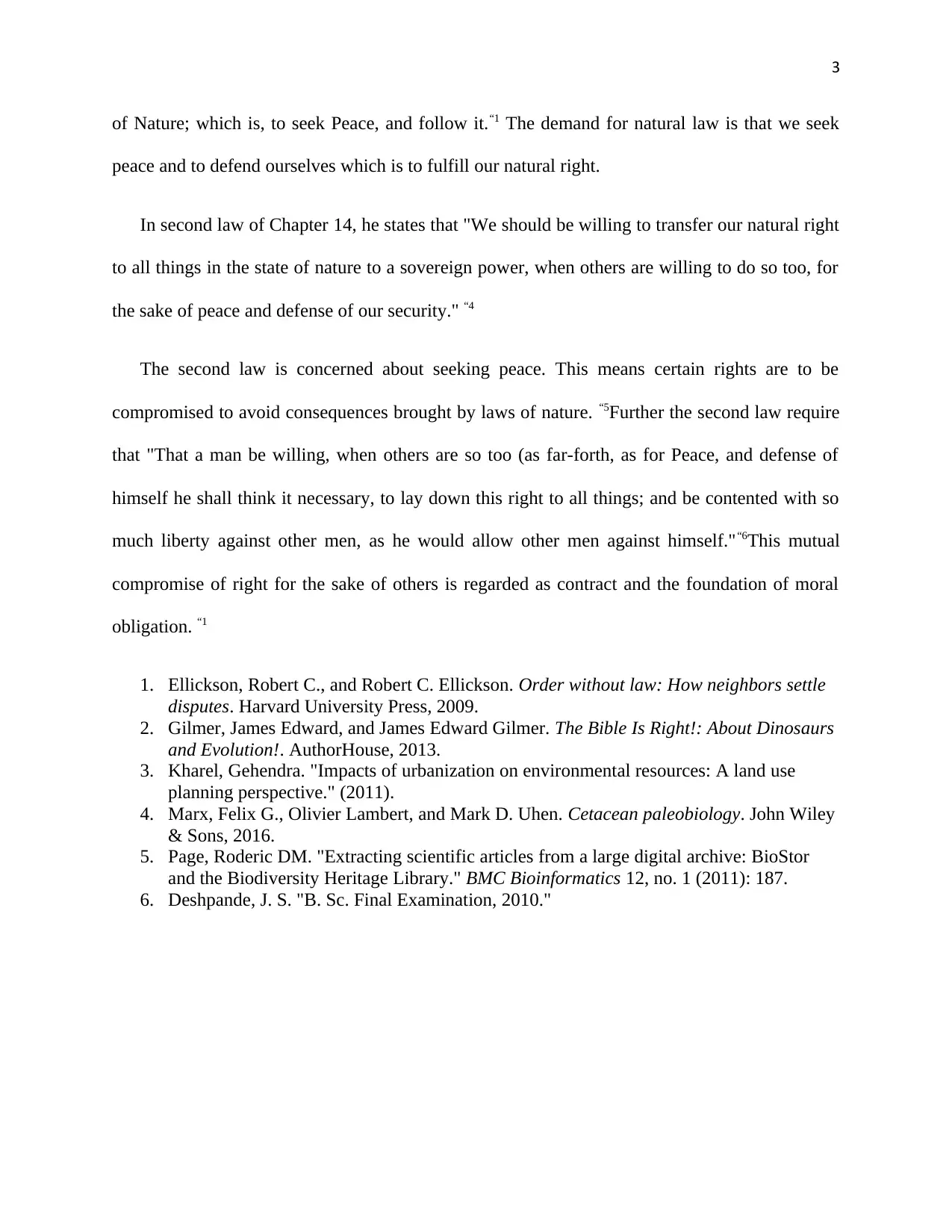
3
of Nature; which is, to seek Peace, and follow it.“1 The demand for natural law is that we seek
peace and to defend ourselves which is to fulfill our natural right.
In second law of Chapter 14, he states that "We should be willing to transfer our natural right
to all things in the state of nature to a sovereign power, when others are willing to do so too, for
the sake of peace and defense of our security." “4
The second law is concerned about seeking peace. This means certain rights are to be
compromised to avoid consequences brought by laws of nature. “5Further the second law require
that "That a man be willing, when others are so too (as far-forth, as for Peace, and defense of
himself he shall think it necessary, to lay down this right to all things; and be contented with so
much liberty against other men, as he would allow other men against himself."“6This mutual
compromise of right for the sake of others is regarded as contract and the foundation of moral
obligation. “1
1. Ellickson, Robert C., and Robert C. Ellickson. Order without law: How neighbors settle
disputes. Harvard University Press, 2009.
2. Gilmer, James Edward, and James Edward Gilmer. The Bible Is Right!: About Dinosaurs
and Evolution!. AuthorHouse, 2013.
3. Kharel, Gehendra. "Impacts of urbanization on environmental resources: A land use
planning perspective." (2011).
4. Marx, Felix G., Olivier Lambert, and Mark D. Uhen. Cetacean paleobiology. John Wiley
& Sons, 2016.
5. Page, Roderic DM. "Extracting scientific articles from a large digital archive: BioStor
and the Biodiversity Heritage Library." BMC Bioinformatics 12, no. 1 (2011): 187.
6. Deshpande, J. S. "B. Sc. Final Examination, 2010."
of Nature; which is, to seek Peace, and follow it.“1 The demand for natural law is that we seek
peace and to defend ourselves which is to fulfill our natural right.
In second law of Chapter 14, he states that "We should be willing to transfer our natural right
to all things in the state of nature to a sovereign power, when others are willing to do so too, for
the sake of peace and defense of our security." “4
The second law is concerned about seeking peace. This means certain rights are to be
compromised to avoid consequences brought by laws of nature. “5Further the second law require
that "That a man be willing, when others are so too (as far-forth, as for Peace, and defense of
himself he shall think it necessary, to lay down this right to all things; and be contented with so
much liberty against other men, as he would allow other men against himself."“6This mutual
compromise of right for the sake of others is regarded as contract and the foundation of moral
obligation. “1
1. Ellickson, Robert C., and Robert C. Ellickson. Order without law: How neighbors settle
disputes. Harvard University Press, 2009.
2. Gilmer, James Edward, and James Edward Gilmer. The Bible Is Right!: About Dinosaurs
and Evolution!. AuthorHouse, 2013.
3. Kharel, Gehendra. "Impacts of urbanization on environmental resources: A land use
planning perspective." (2011).
4. Marx, Felix G., Olivier Lambert, and Mark D. Uhen. Cetacean paleobiology. John Wiley
& Sons, 2016.
5. Page, Roderic DM. "Extracting scientific articles from a large digital archive: BioStor
and the Biodiversity Heritage Library." BMC Bioinformatics 12, no. 1 (2011): 187.
6. Deshpande, J. S. "B. Sc. Final Examination, 2010."
⊘ This is a preview!⊘
Do you want full access?
Subscribe today to unlock all pages.

Trusted by 1+ million students worldwide
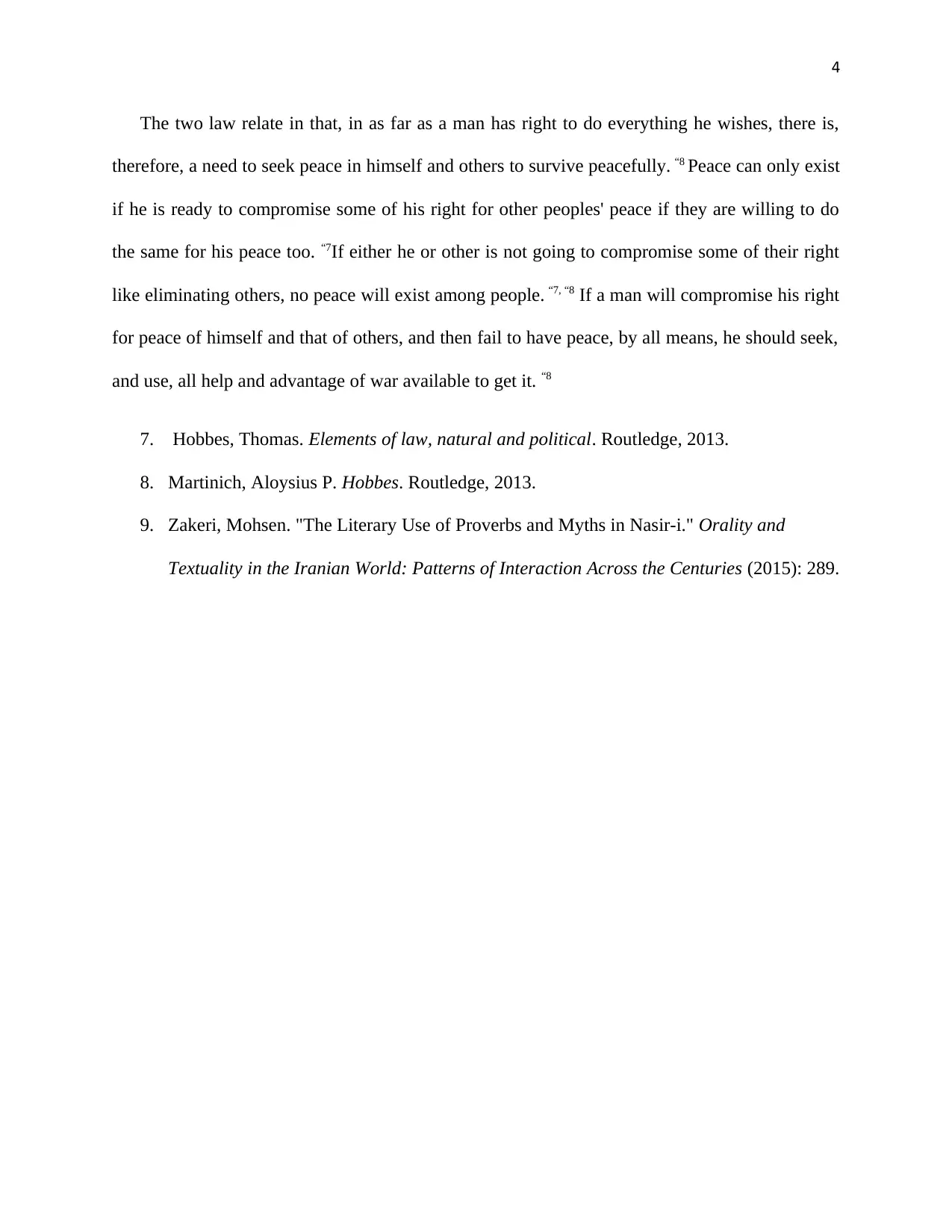
4
The two law relate in that, in as far as a man has right to do everything he wishes, there is,
therefore, a need to seek peace in himself and others to survive peacefully. “8 Peace can only exist
if he is ready to compromise some of his right for other peoples' peace if they are willing to do
the same for his peace too. “7If either he or other is not going to compromise some of their right
like eliminating others, no peace will exist among people. “7, “8 If a man will compromise his right
for peace of himself and that of others, and then fail to have peace, by all means, he should seek,
and use, all help and advantage of war available to get it. “8
7. Hobbes, Thomas. Elements of law, natural and political. Routledge, 2013.
8. Martinich, Aloysius P. Hobbes. Routledge, 2013.
9. Zakeri, Mohsen. "The Literary Use of Proverbs and Myths in Nasir-i." Orality and
Textuality in the Iranian World: Patterns of Interaction Across the Centuries (2015): 289.
The two law relate in that, in as far as a man has right to do everything he wishes, there is,
therefore, a need to seek peace in himself and others to survive peacefully. “8 Peace can only exist
if he is ready to compromise some of his right for other peoples' peace if they are willing to do
the same for his peace too. “7If either he or other is not going to compromise some of their right
like eliminating others, no peace will exist among people. “7, “8 If a man will compromise his right
for peace of himself and that of others, and then fail to have peace, by all means, he should seek,
and use, all help and advantage of war available to get it. “8
7. Hobbes, Thomas. Elements of law, natural and political. Routledge, 2013.
8. Martinich, Aloysius P. Hobbes. Routledge, 2013.
9. Zakeri, Mohsen. "The Literary Use of Proverbs and Myths in Nasir-i." Orality and
Textuality in the Iranian World: Patterns of Interaction Across the Centuries (2015): 289.
Paraphrase This Document
Need a fresh take? Get an instant paraphrase of this document with our AI Paraphraser
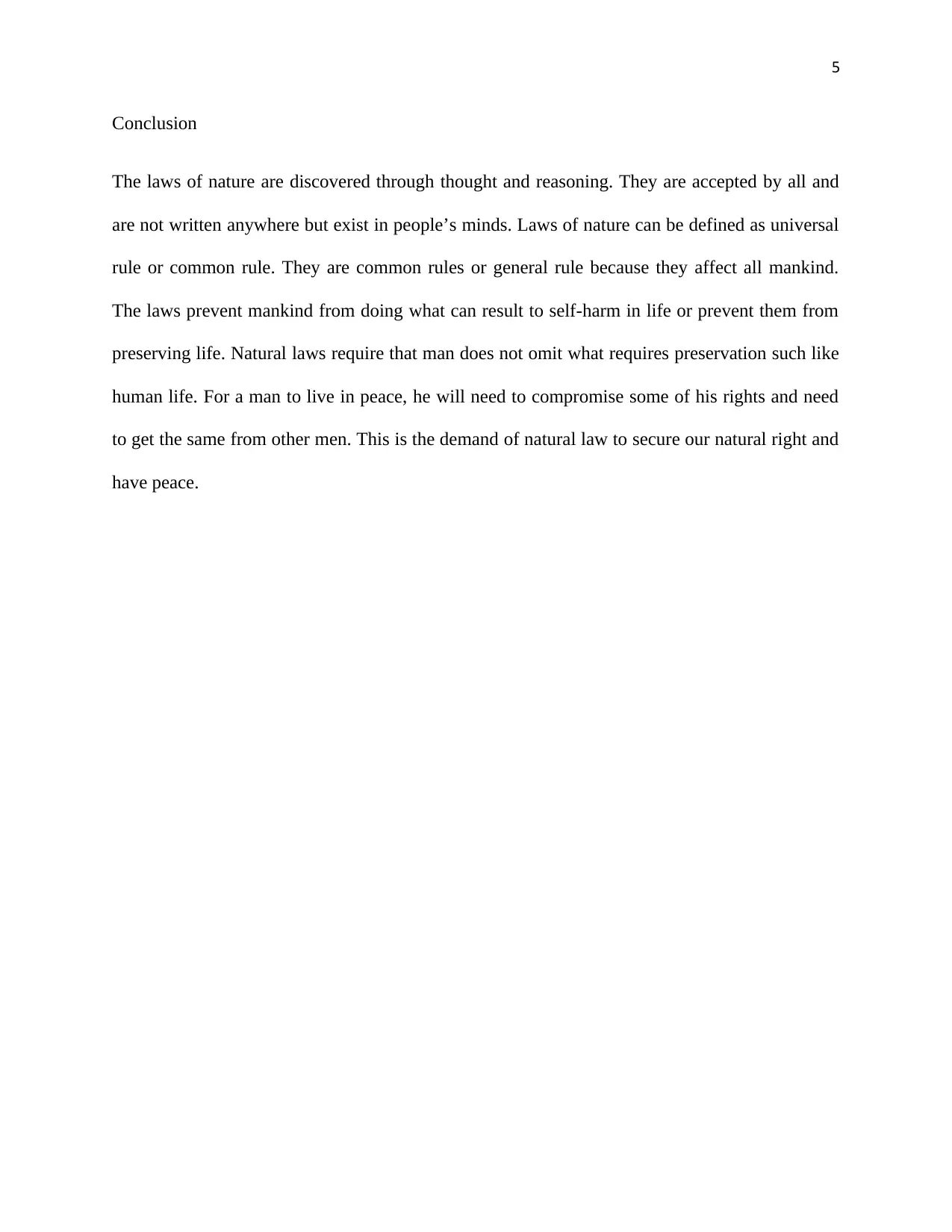
5
Conclusion
The laws of nature are discovered through thought and reasoning. They are accepted by all and
are not written anywhere but exist in people’s minds. Laws of nature can be defined as universal
rule or common rule. They are common rules or general rule because they affect all mankind.
The laws prevent mankind from doing what can result to self-harm in life or prevent them from
preserving life. Natural laws require that man does not omit what requires preservation such like
human life. For a man to live in peace, he will need to compromise some of his rights and need
to get the same from other men. This is the demand of natural law to secure our natural right and
have peace.
Conclusion
The laws of nature are discovered through thought and reasoning. They are accepted by all and
are not written anywhere but exist in people’s minds. Laws of nature can be defined as universal
rule or common rule. They are common rules or general rule because they affect all mankind.
The laws prevent mankind from doing what can result to self-harm in life or prevent them from
preserving life. Natural laws require that man does not omit what requires preservation such like
human life. For a man to live in peace, he will need to compromise some of his rights and need
to get the same from other men. This is the demand of natural law to secure our natural right and
have peace.
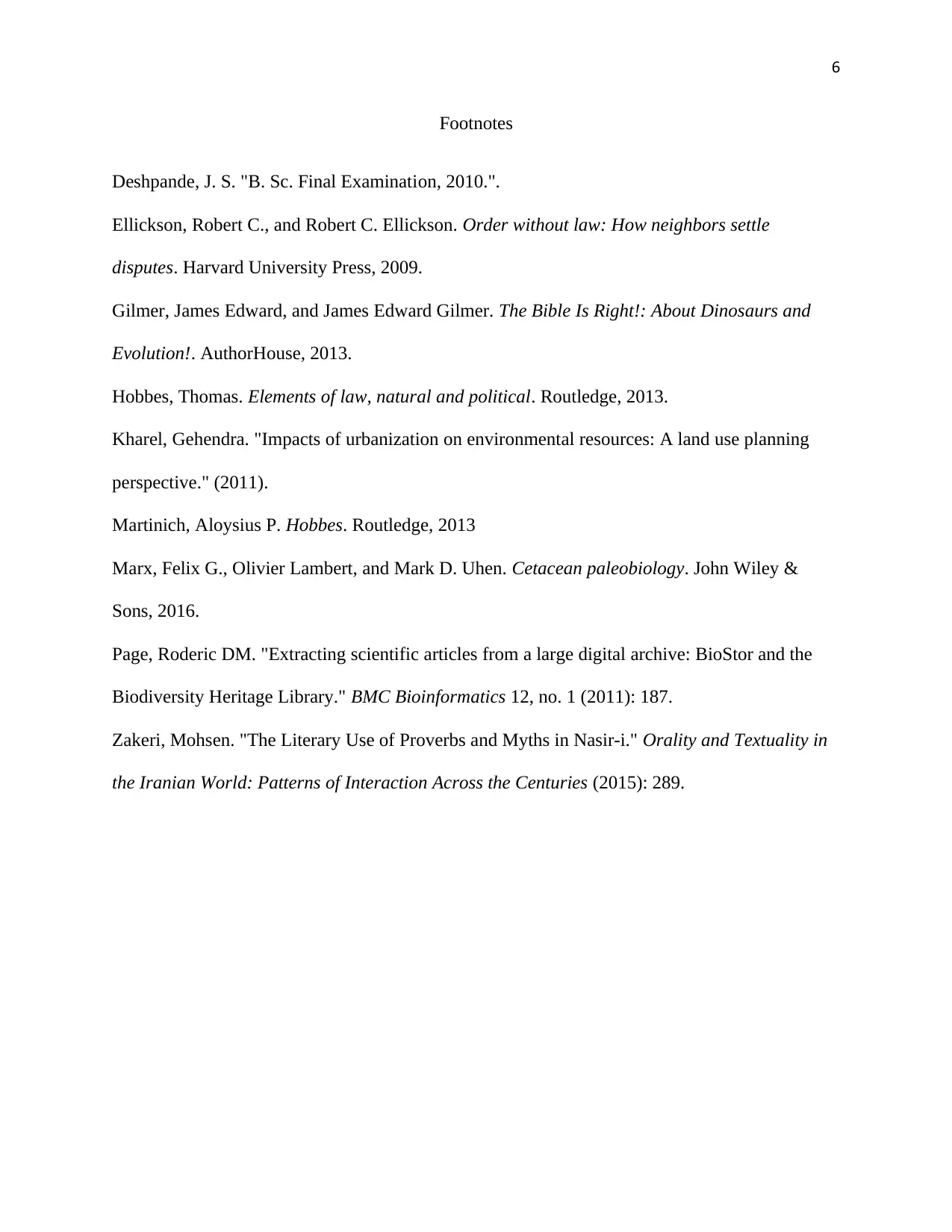
6
Footnotes
Deshpande, J. S. "B. Sc. Final Examination, 2010.".
Ellickson, Robert C., and Robert C. Ellickson. Order without law: How neighbors settle
disputes. Harvard University Press, 2009.
Gilmer, James Edward, and James Edward Gilmer. The Bible Is Right!: About Dinosaurs and
Evolution!. AuthorHouse, 2013.
Hobbes, Thomas. Elements of law, natural and political. Routledge, 2013.
Kharel, Gehendra. "Impacts of urbanization on environmental resources: A land use planning
perspective." (2011).
Martinich, Aloysius P. Hobbes. Routledge, 2013
Marx, Felix G., Olivier Lambert, and Mark D. Uhen. Cetacean paleobiology. John Wiley &
Sons, 2016.
Page, Roderic DM. "Extracting scientific articles from a large digital archive: BioStor and the
Biodiversity Heritage Library." BMC Bioinformatics 12, no. 1 (2011): 187.
Zakeri, Mohsen. "The Literary Use of Proverbs and Myths in Nasir-i." Orality and Textuality in
the Iranian World: Patterns of Interaction Across the Centuries (2015): 289.
Footnotes
Deshpande, J. S. "B. Sc. Final Examination, 2010.".
Ellickson, Robert C., and Robert C. Ellickson. Order without law: How neighbors settle
disputes. Harvard University Press, 2009.
Gilmer, James Edward, and James Edward Gilmer. The Bible Is Right!: About Dinosaurs and
Evolution!. AuthorHouse, 2013.
Hobbes, Thomas. Elements of law, natural and political. Routledge, 2013.
Kharel, Gehendra. "Impacts of urbanization on environmental resources: A land use planning
perspective." (2011).
Martinich, Aloysius P. Hobbes. Routledge, 2013
Marx, Felix G., Olivier Lambert, and Mark D. Uhen. Cetacean paleobiology. John Wiley &
Sons, 2016.
Page, Roderic DM. "Extracting scientific articles from a large digital archive: BioStor and the
Biodiversity Heritage Library." BMC Bioinformatics 12, no. 1 (2011): 187.
Zakeri, Mohsen. "The Literary Use of Proverbs and Myths in Nasir-i." Orality and Textuality in
the Iranian World: Patterns of Interaction Across the Centuries (2015): 289.
⊘ This is a preview!⊘
Do you want full access?
Subscribe today to unlock all pages.

Trusted by 1+ million students worldwide
1 out of 6
Related Documents
Your All-in-One AI-Powered Toolkit for Academic Success.
+13062052269
info@desklib.com
Available 24*7 on WhatsApp / Email
![[object Object]](/_next/static/media/star-bottom.7253800d.svg)
Unlock your academic potential
Copyright © 2020–2026 A2Z Services. All Rights Reserved. Developed and managed by ZUCOL.





